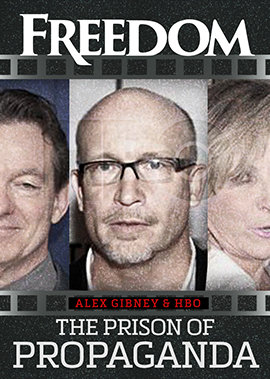What makes them choose to publish this story over that story or cast their subject in a favorable or unfavorable light?
There’s much more than impartial editorial judgment at work here, folks. Behind those long, gray columns of type and those eye-catching, colorful photographs often lurks a dark, hidden secret of economic or political corruption, which causes newspapers to bend—and sometimes obliterate—the truth for nefarious, self-serving reasons.
You see, it’s not unheard of for newspaper owners to try to control the way their readers view things—what they believe and how they think—in accordance with what is economically or politically profitable to those who own and publish the news.
In other words, most media don’t think of how best to serve their readership, whatever their claims. Instead, they think: “What’s in it for me?”
Newspapering is a business, after all, and if you can’t make enough money one way, then you try another.
Take, for example, the British Guardian and Observer newspapers and the underhanded, biased and false way they have portrayed Narconon, the global drug rehabilitation network based on the discoveries and writings of author, humanitarian and Scientology Founder L. Ron Hubbard.
In a recent article written by reporter Shanti Das, Guardian editor Katharine Viner took aim at Narconon, which has successfully rehabilitated thousands of drug addicts, saving their lives and getting them off deadly, soul-killing drugs forever.
It was an unabashed smear piece, using anti-Scientologists and a few disgruntled addicts who participated in the Narconon program, griping that kicking the habit was just too tough for them. Das and Viner also ignored the ample material provided them that evidenced the effectiveness of Narconon—after all, those facts didn’t further their despicable intent and didn’t back up the party line, but merely told the truth. (Looks like The Guardian and Observer follow the old tabloid adage: “Never let the truth get in the way of a good story.”)
Narconon’s methods are designed to get people drug-free—forever. Withdrawing and recovering from addiction admittedly can be difficult. But Narconon does not go along with “harm reduction,” does not accept swapping one addiction for another with drug replacement, and does not give up and cry uncle over the onslaught of drugs. It goes only in one simple, wise direction: Get people off drugs—for good.
The program consists of vitamin and mineral therapy with exercise and extensive periods of sweating in a low-heat, dry sauna, all intended to flush the residual drugs out of an individual’s system completely and set the former addict free from their mental and physical effects. Through life skills courses, the program also addresses the reasons the individual turned to drugs in the first place.
The organization states, “At Narconon, we do not believe an addict is an addict for life. We do not believe addiction is an incurable disease. We believe in getting better.
“We believe a person trapped in the dwindling spiral of substance abuse can take their life back and live drug-free.”
The falsehoods in Das’ article are blatantly obvious. For example: Every incoming Narconon student watches an introductory video in which the program’s origins are spelled out in full, just as they are on Narconon’s website. That same site contains mountains of video testimonials from smiling people who are now completely drug-free, praising the program’s positive influence in enabling them to break the chains of addiction and live valuable, happy lives.
Good old always-reliable propagandist Shanti Das was assigned and wrote the article blasting the shortage, making her, Viner and The Guardian shills for Big Pharma.
So you have to ask: Just why on Earth would a newspaper attack an organization that provides such life-changing and miraculous results for those it helps? Narconon saves lives—what’s the problem with that?
Well, the answer is simple—and Hamletesque. To drug or not to drug, that is the question.
In 2009, The Guardian’s circulation was 358,844. By 2021, that had declined to a measly 108,687. They stopped reporting circulation after that year.
Newspapering is a business, after all, and if you can’t make enough money one way, then you try another, so The Guardian and Observer found a sugar daddy: Hungarian/American billionaire businessman George Soros.

Between 2020 and 2022, The Guardian Foundation, a fundraising arm of The Guardian’s publisher, received a whopping $2.3 million from Soros’ Open Society Foundations, which not only condones continuing drug usage for addicts, but supports “harm reduction.” That involves handing out free hypodermic needles to protect against disease and offering “safe injection sites”—rooms where addicts can go to shoot up without fear of arrest. The Guardian likes safe rooms too, and has said as much in articles like a story headlined, “Drug consumption rooms could save thousands of UK lives…”
Right—and leave them addicted for life.
In other words, Open Society Foundations favors giving up on the war against drugs and making it easier, safer and more acceptable for more and more addicts to keep on using and abusing.
That does not create an “Open Society,” it creates a “Dying Society,” with junkies stumbling around in a narco-haze on every street corner in America while drug companies keep fattening their wallets, peddling various replacement drugs like methadone to maintenance-treat an ever-growing, ever more profitable society of hopeless addicts.
Don’t cure them—use them to get rich!
So, to get Sugar Daddy Soros to pony up the cash, The Guardian and Observer had to tart themselves up a bit, slap on some lipstick and lingerie, and jump on the Open Society Foundations bandwagon by attacking Narconon.
And they did. See how that works?
That’s nothing new for The Guardian and Observer, though. When Guardian editor-in-chief Katharine Viner’s hubby, Adrian Chiles, wrote in 2023 that he had been diagnosed with ADHD, but now there was a shortage of the psychotropic drugs he wanted to take, The Guardian went to bat for him.
Good old always-reliable propagandist Shanti Das was assigned and wrote the article blasting the shortage, making her, Viner and The Guardian shills for Big Pharma.
But The Guardian went further than that: They actually ran an article saying that not enough children are being given ADHD drugs!
These are drugs like Ritalin, described by the Drug Enforcement Administration as producing “effects that are indistinguishable from cocaine” and found by drug regulatory agencies and studies to be capable of causing heart attacks, depression, hallucinations, stroke, suicide and sudden death.
Just who are they really working for?
The Guardian even praised a former Colombian official’s words when he told the Global Commission on Drug Policy that a society free of drug use is “unrealistic, totally naive, almost stupid … that we are going to live in a world free of drugs—which will never happen, which is never happening.”
Narconon believes we can—and someday will.






















